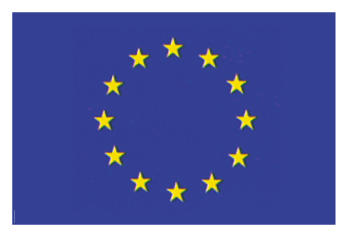Ukraine Signs Trade Pact With EU
Friday, June 27th, 2014June 27, 2014
Three ex-Soviet states—Georgia, Moldova, and Ukraine—signed a trade-pact agreement in Brussels today with the European Union (EU). The pact lifts trade tariffs between the three nations and the EU and also offers EU aid with badly needed economic reforms to the former Soviet nations.

The official flag of the European Union, or EU (World Book illustration).
It was this trade pact that led to Ukraine’s current crisis with Russia. Last November, under great pressure from Russia and Russian president Vladimir Putin, Ukraine’s former president Viktor Yanukovych refused to sign the EU trade pact that would have brought Ukraine closer to Europe’s sphere of influence, instead choosing closer economic ties with Russia. His refusal created a political crisis, as thousands of Ukrainians staged protests in the streets of Ukraine’s capital, Kiev. These street protests continued into 2014; when police and protestors clashed in February 2014, more than 100 protestors were killed, and Ukraine’s parliament voted to oust Yanukovych. An interim government was formed. Days later, Russia, claiming it was protecting Russian-speaking Ukrainians, began its occupation of the Ukrainian peninsula of Crimea. Russia also began aiding pro-Russian separatists in eastern Ukraine. Ukraine’s interim government held elections, and billionaire Petro Poroshenko was elected president of Ukraine on May 25. On June 20, Poroshenko declared a ceasefire in eastern Ukraine. Due to expire today, diplomats were working to extend the shaky ceasefire between Ukrainian troops and separatists through Monday, June 30.
Upon signing the trade pact, President Poroshenko exclaimed “What a great day! It is a historic day, the most important day since independence.” Russia’s reaction to Ukraine’s pact with the EU was immediate. Russia threatened Ukraine with extreme trade restrictions. A senior adviser to President Putin referred to President Poroshenko as a “Nazi” and called the signing “illegitimate.” International affairs experts suggested that President Putin’s displeasure with the new agreement has more to do with the psychological blow of having three former states shift away from Russian influence. The trade pact itself will take some time to even begin to change the economic relationships between Russia and its one-time satellites.
Additional World Book articles:


